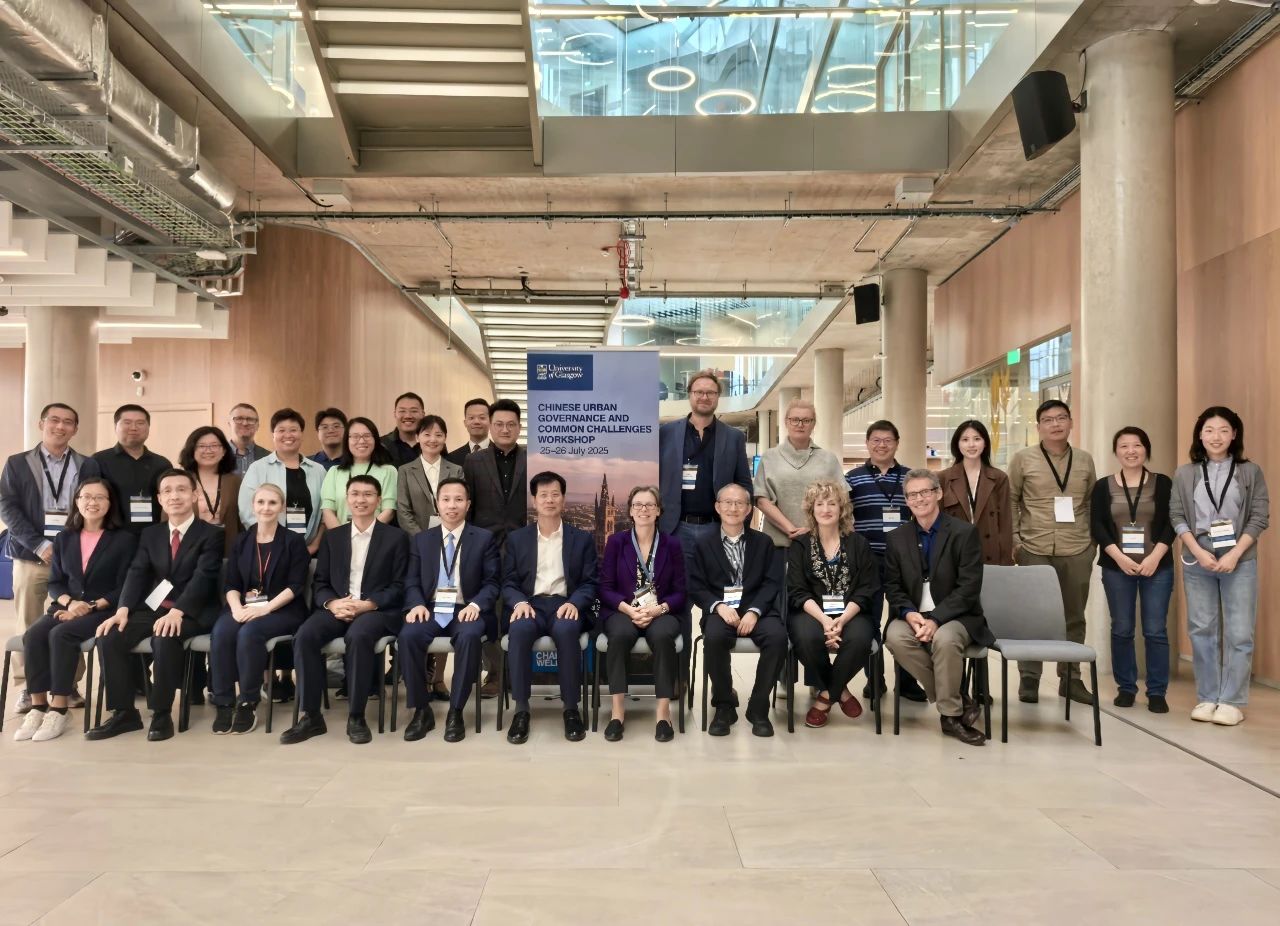Recently, the Central Urban Work Conference was held in Beijing, outlining seven key tasks for urban development. On the occasion of thoroughly studying and implementing the spirit of the Central Urban Work Conference, the Shenzhen University School of Government and the Institute of Global Mega-City Governance, in collaboration with the University of Glasgow School of Social and Political Sciences and the Scottish Centre for China Research, successfully held the Chinese Urban Governance and Common Challenges Workshop on July 25–26, 2025, at the University of Glasgow.
The seminar brought together nearly 40 faculty and students from prestigious institutions worldwide, including the University of Oxford, University College London (UCL), King’s College London (KCL), University of Glasgow, Lancaster University, University of Strathclyde, University of Kent, Liverpool John Moores University, University of Zurich, University of Copenhagen, Peking University, Beijing University of Science and Technology, and Shenzhen University, to discuss cutting-edge issues and common challenges in Chinese urban governance.

The seminar featured eight thematic discussion sessions and one keynote speech session. On the morning of July 25, Professor Jane Duckett, Director of the Scottish Centre for China Research and Edward Caird Chair of Politics at the University of Glasgow; Professor Yu Keping, Dean of the Shenzhen University School of Government, Director of the Institute of Global Mega-City Governance, and Chair Professor at Peking University; and Professor Ariadne Vromen, Head of the Department of Politics and International Relations at the University of Glasgow, delivered opening remarks.
During the keynote speech session, Dean Yu Keping delivered a lecture titled “Megacities and Human Development: The Case of China.”. Dean Yu noted that humans are not only “political animals” but also “urban species,” with urban civilization epitomizing human civilization. In the 21st century, the leading role of cities has become increasingly prominent, with megacities serving as the most powerful engines of human development. Using China as an example, he analyzed United Nations Development Programme Human Development Index (HDI) data for nearly 700 Chinese cities, finding that megacities play a significant leading role in dimensions such as living standards, education, healthcare, and democratic governance, emphasizing that megacities should be regarded as a distinct and critical field in human development research.
In the thematic discussion sessions, scholars including Associate Professor Patricia Thornton from the University of Oxford China Centre; Professor Wu Fulong from the Bartlett School of Planning at UCL; Dr. Aleksandra Kuba from the School of Global Affairs at KCL; Professor Jane Duckett, Dr. Wang Hua, and Holly Snape from the University of Glasgow’s Politics Department; Dr. Lin Ou from Lancaster University’s Law School; Associate Professor Chris Mittelstaedt from the University of Zurich’s Political Science Department; Associate Professor Liu Jun from the University of Copenhagen’s Political Science Department; Associate Professor Fei Haiting and Assistant Professor Gu Chao from Peking University’s Center for Chinese Politics; and Assistant Professor Li Yan from Beijing University of Science and Technology’s School of Law and Humanities engaged in discussions across eight themes. Theme 1, “Innovation and Transformation in Urban Governance,” explored innovations and changes in urban governance; Theme 2, “Urban Governance, Health, and Healthcare,” focused on health and healthcare issues in urban governance; Theme 3, “Macro Patterns and Perceptions of Urban Governance,” analyzed urban governance models and perceptions from a macro perspective; Theme 4, “Environmental Governance and Urban Development,” addressed the relationship between environmental governance and urban development. Additional themes included “Techniques and Art of Governance,” “Governance and ‘New Employment Groups,’” “Society and Governance,” and “Governance, China, and the World.” Scholars shared diverse perspectives and engaged in robust exchanges during the discussions.
Faculty from our School presented their latest research findings at the seminar. Professor Chen Wen, Executive Dean, presented on “Swift Response to Public Complaints: How Do China’s Megacities Meet the Needs of Every Citizen?” exploring the “rapid response to public demands” mechanism. Using a mixed-methods approach from the perspective of interaction between public expression and government response, he studied the “swift response” reforms in Chinese megacities, analyzing how “responsive governance” with Chinese characteristics enhances the responsiveness of urban governance systems, strengthens public opinion integration through organizational coordination, and shifts the focus of governance downward through improved response mechanisms. Professor Liu Xiao presented on “Urban Governance Innovation in China during the Rapid Urbanization Process: Take Shenzhen City as an Example,” exploring innovations in Chinese urban governance during rapid urbanization. She found that Shenzhen’s urban governance is reflected in the municipal government’s extension to traditional rural grassroots areas, achieved through legal measures to promote urban expansion, land system reforms to ensure jurisdictional coverage, and policy innovations to restructure grassroots governance models, proposing that urban governance in the new era should focus on urban-rural feedback and equitable benefit distribution. Researcher Ran Ran presented on “It Takes a Megacity to Raise ‘Our Kids’? A Case Study of Shenzhen’s Child-Friendly City Initiative,” exploring how megacities balance economic growth with children’s needs. Analyzing the initiative’s policy formulation and implementation over the past decade, she noted that hyper-urbanization exacerbates social inequalities and called for reimagining Shenzhen as a global city prioritizing equitable access to education and other resources. Professor Gu Zhijun, Vice Dean, presented on “From Viral to Vital: The Impact of City Branding Strategies on Internet-Famous Cities,” focusing on the rise and sustainability of internet-famous cities. Through a mixed-methods study of 28 Chinese internet-famous cities, he found that public policy and official branding help sustain long-term city recognition, while public participation and user-generated content are more critical in their initial rise, suggesting that governments strategically integrate tourism policies with existing city labels. Professor Yuan Fangcheng presented on “Mapping the MEGA Era: Global Framework for Assessing Megacity Governance,” proposing that as global urbanization accelerates in the 21st century, megacities with populations exceeding 10 million have become central nodes for global economic, cultural, and political activities. His research introduced a comprehensive survey framework to assess the governance effectiveness of global megacities, addressing challenges posed by large population scales, highly developed economic systems, diverse socio-cultural landscapes, and complex infrastructure networks. Assistant Professor Guo Jing presented on “Study on the High-Quality Development of Megacities: International Comparisons and China’s Strategies,” conducting an international comparative study on the high-quality development of megacities. He noted gaps between Chinese megacities and those in developed economies in terms of economic scale, estimated optimal population sizes for central urban areas based on international practices and scenario simulations, and projected trends toward high-density, large-scale economic development and multi-center, networked spatial structures in megacities. Associate Professor Yuan Chao presented on “Aesthetics, Social Order, and Micro-power: Observations on the ‘Spectacle’ Narrative in Shenzhen City,” using Shenzhen’s public squares as a case study. Combining Lacan and Foucault’s theories, he noted that public squares are accessible spaces implicitly requiring participation. He proposed that landscape designers discipline individuals through attention mechanisms, with landscape aesthetics closely tied to micro-power and order construction, implementing policies and shaping individuals through accessibility while fostering “uniform order” through inaccessibility, offering insights into the role of landscapes in urban governance and revealing the regulatory and order-building roles of aesthetic elements in public spaces and individual behavior. Special Researcher Zhou Hongyun presented on “Social Participation in China’s Urban Governance,” using the analytical framework of “fuzzy governance” to explain practices and innovations in social participation within urban social governance.
The seminar not only facilitated high-quality academic exchanges between Chinese and international scholars but also fostered consensus on long-term cooperation. Post-seminar, both parties engaged in in-depth discussions on platform co-construction, faculty visits, student exchanges, and research collaboration, exploring specific cooperative initiatives.
Appendix:
The University of Glasgow, founded in 1451, is a member of the Russell Group. In the 2025 QS World University Rankings, it ranks 78th globally and 12th in the UK, maintaining a position in the global top 100 and UK top 15 for five consecutive years, with an academic reputation score of 82.3 (56th globally), employer reputation score of 78.6 (71st globally), and international faculty-student ratio score of 99.9 (14th globally). Its programs, such as Veterinary Medicine (12th globally) and Library and Information Management (14th globally), rank among the world’s best. The university has produced eight Nobel laureates and distinguished alumni like Adam Smith and James Watt, who have profoundly impacted global development. With its outstanding academic strength, extensive international collaborations, and rich historical legacy, the University of Glasgow holds a significant position on the global academic stage, exerting key influence.
Layout | Liu Weirui
Initial Review | Yuan Chao
Secondary Review | Luo Wenting
Final Review | Gu Zhijun

